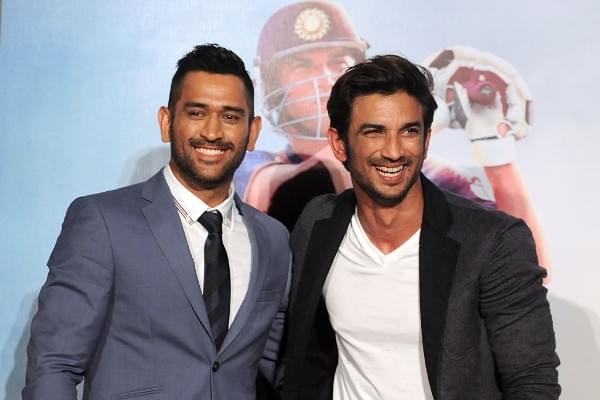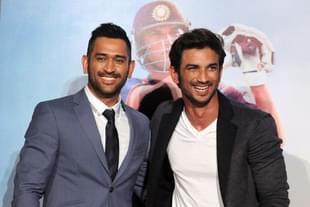Movies
The Unlikely Megastar Scores Big In MS Dhoni: The Untold Story
Biswadeep Ghosh
Oct 02, 2016, 03:52 PM | Updated 03:52 PM IST
Save & read from anywhere!
Bookmark stories for easy access on any device or the Swarajya app.


Patna is an exciting city to watch MS Dhoni: The Untold Story in. For, it was the capital of the then undivided Bihar where Mahendra Singh Dhoni was born, in Ranchi, on 7 July 1981. Lucky to watch it here in Patna, this writer got to see the viewers around him rooting for ‘their boy’ even before the start of the show in Regent Theatre near Gandhi Maidan.
This reaction is a reminder of the cricketer’s stature in every town and city, where the film has registered outstanding scores at the ticket counters. With a reported Rs 21.30 crore collections on day one, it has earned more than any non-Khan release on the opening day.
But apart from the noise and fanfare, one must ask the obvious question. How good is the film?
Critics might insist that it is a hagiography, but such a take isn’t accompanied by an assessment of whether or not it highlights what is untold (which it does) and ‘if’ that is what keeps the viewer interested (which it does).
The average viewer, in other words, may not be a connoisseur of cinema. But, this reviewer (Biswadeep Ghosh is the author of the biography MSD: The Man, The Leader) knows his Dhoni (Sushant Singh Rajput) inside out, and he is the one enjoying this film with its several untold subplots, which have been woven into the story.
Dhoni has been the subject of several books. But none of them tells us that the hospital doctor had mistaken him for a girl child in 1981.
His school team coach Keshab Banerjee (Rajesh Sharma) would accompany his wife to the fish market and try to wrap up the rituals as soon as possible to be with his budding pupils at the stadium.
As a rookie ticket checker in Kharagpur, Dhoni had to sprint from one platform to another because he had been asked to collect some documents from officials in charge of the two trains that had reached at the same time. This had happened on his first day at work.
Nobody has written how destiny had pulled its shutters down on his budding relationship with his first girlfriend, Priyanka (Disha Patani). After all, who even knew about it?
He had bumped into Sakshi (Kiara Advani), an intern in Taj Bengal, who didn’t recognise him. Later, Dhoni would wear a cap and a strange pair of glares and hang around with her in all sorts of public places. Initially, Sakshi’s friend, Ritu, accompanied her.
Several such stories in the film keep the viewers hooked. Cricket doesn’t dominate, which storytellers Neeraj Pandey and Dilip Jha had clarified in the title itself. Leaving out the Indian Premier League spot-fixing controversy, for instance, wouldn’t have been easy. But, what could Dhoni have said that we don’t already know?
Two chapters in Mahi’s life for which Indian cricket will be thankful to him are his triumphs as the skipper in the 2007 International Cricket Council (ICC) World Twenty20 and 2011 ICC Cricket World Cup in the 50-over format. These two occasions are memorable cricketing takeaways with hardly any surprises.
The film takes us through Dhoni’s journey as he goes past hurdles like his father Pan Singh’s (Anupam Kher) disapproval and the Railways’ casual dismissal of his chances of playing in the organisation’s team. With him are his friends like Santosh Lal and Paramjit Singh, whose assistance would help him touch the highest peak of megastardom.
Director and co-writer Neeraj Pandey is able to generate the atmosphere on most occasions. He falters on one count though. There is too much emphasis on the Dhoni-Sakshi relationship, which makes it unnecessarily long. That apart, Pandey deserves a huge round of applause for his command over his subject.
Patani, who plays his first girlfriend, is charming and spontaneous. Advani, who plays Sakshi, is attractive. But she still needs to qualify as a good actress.
Two actors who merit a special mention are Kher as the father and Sharma as Banerjee, the sports teacher. Herry Tangri in a brief role as Yuvraj Singh is a surprise, and Bhumika Chawla is effortlessly likeable as his sister Jayanti Gupta.
The film, ultimately, belongs to two individuals who made it happen: the man whose story it is and Rajput, who nails his part. The cricketer hasn’t been reduced to a hazy memory; yet, the actor’s portrayal is so convincing that he makes us forget the larger-than-life presence at times.
Is this his best performance so far? It is, and a many-awards-guaranteed one at that.
Ranchi is where Dhoni continues to live. Kharagpur is where he was employed with the Railways. The film was shot in both these places, making them come alive in the context of the story.
In no way is MS Dhoni: The Untold Story a conventional biopic. It shows us how Dhoni had countered the odds, grappled with insecurities and disappointments—and also how his life, with his future wife, changed after he became a star first and the most unlikely captain after that.
Today, Dhoni is nowhere near the force he used to be. The film doesn’t show his decline. That is PR. And not surprising, since Dhoni himself has been personally involved in the film and has supposedly charged a gigantic sum to reveal “the untold story”. And one must not forget that he remains India’s captain other than in the Test format, from which he retired unexpectedly—a decision that was entirely his own.
MS Dhoni: The Untold Story is not only for diehard MSD fans to enjoy.
Having started out as a journalist at 18, Biswadeep Ghosh let go of a promising future as a singer not much later. He hardly steps out of his rented Pune flat where he alternates between writing or pursuing his other interests and and looks after his pet sons Burp and Jack.




